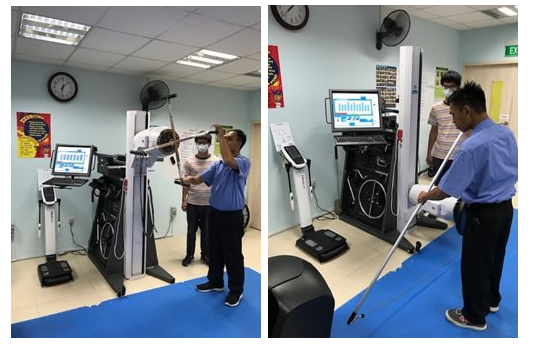Project Back-to-Basics B2B
Year Published 2020
Achieving Superior Therapy with Technology

As Singaporeans live longer lives, including persons with disabilities, the demand for social services, including therapy services, is set to increase. Hence, NCSS has initiated Project Back-to-Basics (B2B) to find breakthrough and sustainable improvements to further boost productivity of Therapists in the disability sector.
The Association for Persons with Special Needs (APSN) is one of the 8 Social Service Agencies that is currently participating in B2B, through their APSN Centre for Adults (CFA), which is a Sheltered Workshop.
APSN CFA provides realistic on-the-job training to prepare the trainees for the workforce. It achieves this objective through a comprehensive training curriculum which trains, places and supports the trainees for employment.
Through the B2B project, APSN has purchased BTE PrimusRS, which can help the Occupational Therapist (OT) to
- Increase direct trainee therapy interventions hours as the OT can prescribe the protocols to administer the use of the BTE, so that the Therapist Assistant can carry out the session with minimal or remote supervision.
- Expand the range of therapeutic interventions.
- Decrease time needed for documentation.
BTE PrimusRS is a unique, functional rehabilitation system that allows the OT to replicate the trainees’ real-life physical tasks. It also provides objective tools for conducting assessments to establish trainees’ baseline strength and range of motion measures, pinpoint deficiencies, identify asymmetries, and build their treatment plan accordingly. When conducting training for task-specific functions, the BTE also provides real-time evaluation and progress tracking.
APSN CFA has conducted a pilot earlier this year with BTE PrimusRS and the results have been very promising. There was an increase in direct trainee therapy time, where at the peak of the pilot, the number of direct trainee therapy hours hit 40.85 hours, a 47% increase from baseline.
Furthermore, the increased therapy sessions are mainly done by the Therapist Assistant with the support of BTE as now the OT now focuses more on programme planning, design BTE protocols, as well as handling more complex cases. The OT also doubled the number of supervision hours to the Therapist Assistant, providing long-arm supervision.
In addition, 78% of the trainees involved in the pilot also saw an improvement in their Work Support Profile (WSP) scores, which meant that the trainees were able to display more on-task vocational skills and cognitive abilities. As a result, this would potentially increase the trainees’ chances to secure jobs in the open employment.
Therapist Assistant
“With the BTE, I have more options and advanced modality to conduct therapy for the trainees. It is a progression from simpler modalities like theraputty. I can use the new machine to implement new exercises and therapy for the trainees in line with their job demands. I am also challenged to think of other protocols to help trainees improve their endurance and become more employable.”
APSN Instructor
“There was verbal feedback previously (before the pilot). Now there is data and concrete evidence (from the BTE) and I can see if there is improvement to the trainee. Helps instructors with planning.”
Instructor in charge of the Bakery Enterprise
“My trainee’s stamina has improved. He can stand for a longer time and learned how to position his body correctly. He is also able to pay more attention and be more focused in the task.”
Instructor in charge of the Catering Enterprise
“When doing dishwashing, my trainee is faster and more actively helping.”
